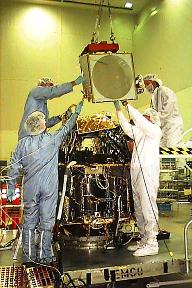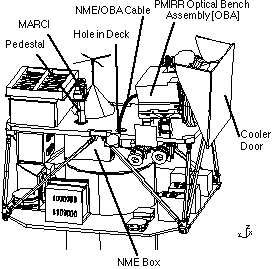 | |||||
|
| Pressure Modulator Infrared Radiometer (PMIRR) |
|---|

The PMIRR instrument being placed on top of the Mars Climate Orbiter spacecraft |
| Multispectral limb and nadir scanning atmospheric sounder |
| Provides vertical profiles of atmos. temp, dust, water vapor & clouds, quantifies surface radiative balance |
| Radiator door deployed upon achieving mapping orbit |
| Nominal FOV (Field of View) includes aft limb. Can also view out of spacecraft orbit plane |
| Vertical resolution = 5 km |
PMIRR is a nine-channel limb and nadir scanning atmospheric sounder designed to vertically profile atmospheric temperature, dust, water vapor and condensate clouds and to quantify surface radiative balance. PMIRR observes in a broadband visible channel, calibrated by observations of a solar target mounted on the instrument, and in eight spectral intervals between 6 and 50 µm in the thermal infrared. High spectral discrimination in the 6.7 µm water vapor band and in two parts of the 15 µm carbon dioxide bands is achieved by employing pressure (density) modulation cells in front of selected spectral detectors. Adequate signal-to-noise in these channels is ensured through the placement of their detectors on a cold focal plane assembly cooled to 80 K by a passive radiative cooler. The PMIRR Principal Investigator is Dr. Daniel McCleese (JPL/Caltech); Vasily Moroz (IKI/Russia) is Joint Principal Investigator.

|
PMIRR science observations will commence only after the PMIRR
radiator door is fully opened. Once PMIRR is deployed in the
mapping orbit, vertical profiles of atmospheric properties are
constructed from observations in three fields-of-view (FOV) stepped
across the limb and onto the planet using a two-axis scan mirror
in front of the primary telescope. Nominally, PMIRR views the
aft limb, referenced to the spacecraft, except for the polar regions
where it routinely views in and out of the plane of the spacecraft
track to quantify the polar surface albedo by observing much of
the bi-direction reflectance distribution function. PMIRR can
also view to the side limb, acquiring observations characterized
by different local times. PMIRR's vertical resolution is 5 km.
| Home | Mars Climate Orbiter | Mars Polar Lander | Deep Space 2 Microprobes |
| Welcome | Mailing List | Links | Credits |
For questions or comments on this website please refer to our list of contacts.